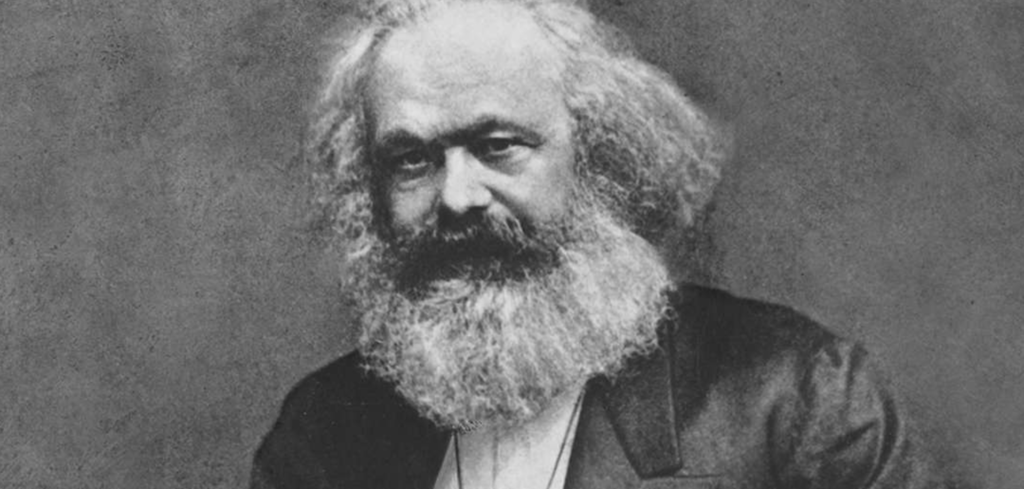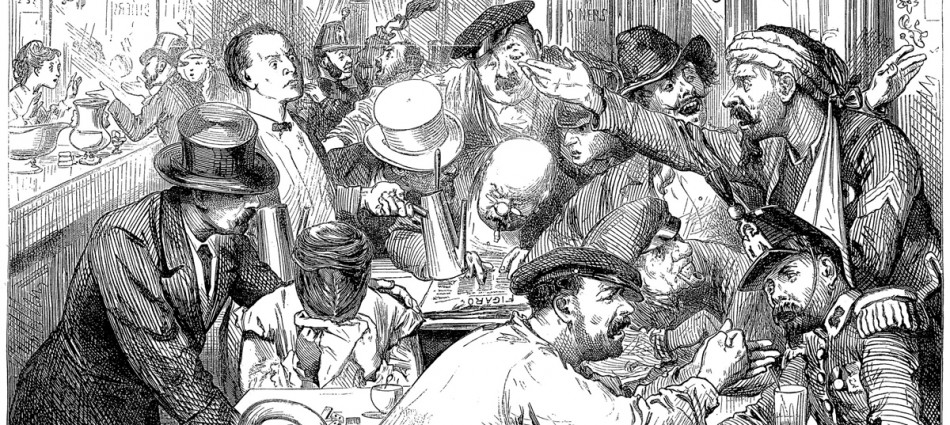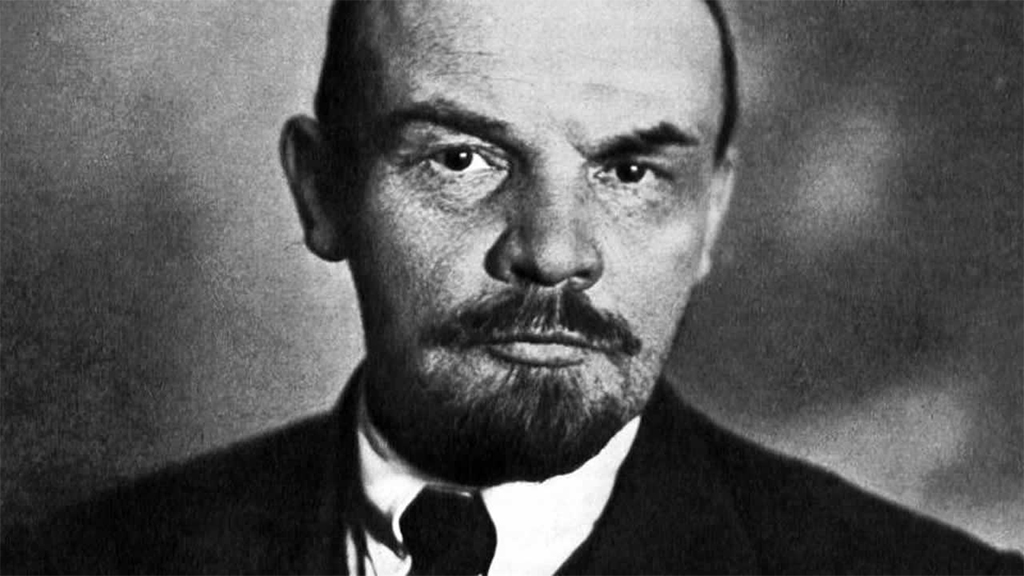Wednesday Jan. 15, 2:30PM at Kresge Study Center Room 348

This teach-in will be led by Matthew Ramirez.
In the mid-19th century, Marx and Engels observed, in the Communist Manifesto, that a "specter" was haunting Europe â the specter of Communism. A century and a half later, it is Marxism itself that continues to haunt the Left, while capitalism remains.
What does it mean that Marx and Marxism still appeal, while political movements for socialism are weak or non- existent? What were Marxism's original points of departure for considering radical possibilities for freedom that might still speak to the present?
How does Marxism still matter?
II. Introduction to revolutionary Marxism
Tuesdays 6-8 via Zoom. For meeting ID/URL, please RSVP at london@platypus1917.org
(Previously Wednesdays, 6-8pm, University of Manchester A213 Samuel Alexander Building M13 9PP)
• required / + recommended reading
Marx and Engels readings pp. from Robert C. Tucker, ed., Marx-Engels Reader (Norton 2nd ed., 1978)
Recommended winter break preliminary readings:
+ Leszek Kolakowski, “The concept of the Left” (1968)
+ Richard Appignanesi and Oscar Zarate / A&Z, Introducing Lenin and the Russian Revolution / Lenin for Beginners (1977)
+ Sebastian Haffner, Failure of a Revolution: Germany 1918–19 (1968)
+ Tariq Ali and Phil Evans, Introducing Trotsky and Marxism / Trotsky for Beginners (1980)
+ James Joll, The Second International 1889–1914 (1966)
+ Edmund Wilson, To the Finland Station: A Study in the Writing and Acting of History (1940), Part II. Ch. (1–4,) 5–10, 12–16; Part III. Ch. 1–6
Film screening | Jan. 15, 2020
Fall of Eagles episodes: #5 "The Last Tsar" and #6 "Absolute Beginners" on the origins of the Bolsheviks
Film screening | Jan. 22, 2020
Reds (1981) film on American anarchists, Socialists and Communists in WWI and the Russian Revolution
Winter–Spring 2020
II. Introduction to revolutionary Marxism
Week 11. Revolutionary leadership | Jan. 29, 2020
• Rosa Luxemburg, “The Crisis of German Social Democracy” Part 1 (1915)
• J. P. Nettl, “The German Social Democratic Party 1890–1914 as a Political Model” (1965)
• Cliff Slaughter, “What is Revolutionary Leadership?” (1960)
Week 12. Reform or revolution? | Feb. 5, 2020
• Luxemburg, Reform or Revolution? (1900/08)
+ Eugene Debs, "Competition versus Cooperation" (1900)
Week 13. Lenin and the vanguard party | Feb. 12, 2020
• Spartacist League, Lenin and the Vanguard Party (1978)
+ Richard Appignanesi and Oscar Zarate / A&Z, Introducing Lenin and the Russian Revolution / Lenin for Beginners (1977)
Week 14. What is to be done? | Feb. 19, 2020
• V. I. Lenin, What is to be Done? (1902)
+ Richard Appignanesi and Oscar Zarate / A&Z, Introducing Lenin and the Russian Revolution / Lenin for Beginners (1977)
Week 15. Mass strike and social democracy | Feb. 26, 2020
• Luxemburg, The Mass Strike, the Political Party and the Trade Unions (1906)
+ Luxemburg, "Blanquism and Social Democracy" (1906)
Week 16. Permanent revolution | Mar. 4, 2020
• Leon Trotsky, Results and Prospects (1906)
+ Tariq Ali and Phil Evans, Introducing Trotsky and Marxism / Trotsky for Beginners (1980)
Week 17. State and revolution | Mar. 11, 2020
• Lenin, The State and Revolution (1917)
Week 18. Imperialism | Mar. 18, 2020
• Lenin, Imperialism, the Highest Stage of Capitalism (1916)
+ Lenin, Socialism and War Ch. 1 The principles of socialism and the War of 1914–15 (1915)
Week 19. Failure of the revolution | Mar. 25, 2020
• Luxemburg, “What does the Spartacus League Want?” (1918)
• Luxemburg, “On the Spartacus Programme” (1918)
+ Luxemburg, "German Bolshevism" (AKA "The Socialisation of Society") (1918)
+ Luxemburg, “The Russian Tragedy” (1918)
+ Luxemburg, “Order Reigns in Berlin” (1919)
+ Eugene Debs, “The Day of the People” (1919)
+ Sebastian Haffner, Failure of a Revolution: Germany 1918–19 (1968)
Week 20-21. Apr. 1/8 2020 - Easter break / Platypus International Convention, Chicago, April 3-5.
Week 22. Retreat after revolution | Apr. 15, 2020
• Lenin, “Left-Wing” Communism: An Infantile Disorder (1920)
+ Lenin, "Notes of a Publicist" (1922)
Week 23. Dialectic of reification | Apr. 21, 2020
• Lukács, “The Standpoint of the Proletariat” (Part III of “Reification and the Consciousness of the Proletariat,” 1923). Available in three sections from marxists.org: section 1 section 2 section 3
+ Being and becoming (freedom in transformation) / immanent dialectical critique chart of terms
+ Commodity form chart of terms
+ Capitalist contradiction chart of terms + Organic composition of capital chart of terms
+ Reification chart of terms
+ Lukács, “The phenomenon of reification” (Part I of “Reification and the consciousness of the proletariat,” History and Class Consciousness, 1923)
Week 24. Lessons of October | Apr. 28, 2020
• Trotsky, The Lessons of October (1924) [PDF]
• Trotsky, "Stalinism and Bolshevism" (1937)
Week 25. Trotskyism | May 5, 2020
+ Trotsky, "To build communist parties and an international anew" (1933)
+ Trotsky, "If America should go communist" (1934)
• Trotsky, The Death Agony of Capitalism and the Tasks of the Fourth International (1938)
+ Trotsky, "Trade unions in the epoch of imperialist decay" (1940)
+ Trotsky, Letter to James Cannon (September 12, 1939)
Week 26. The authoritarian state | May 12, 2020
• Friedrich Pollock, "State Capitalism: Its Possibilities and Limitations" (1941) (note 32 on USSR)
• Max Horkheimer, "The Authoritarian State" (1942)
+ Capitalist contradiction chart of terms
Week 27. On the concept of history | May 19, 2020
• epigraphs by Louis Menand (on Edmund Wilson) and Peter Preuss (on Nietzsche) on the modern concept of history
+ Charles Baudelaire, from Fusées [Rockets] (1867)
+ Bertolt Brecht, "To posterity" (1939)
+ Walter Benjamin, "To the planetarium" (from One-Way Street, 1928)
+ Benjamin, "Fire alarm" (from One-Way Street, 1928)
[JPG] [PDF]
+ Benjamin, "Experience and poverty" (1933)
+ Benjamin, Theologico-political fragment (1921/39?)
+ Benjamin on history chart of terms
• Benjamin, "On the Concept of History" (AKA "Theses on the Philosophy of History") (1940) [PDF]
• Benjamin, Paralipomena to "On the Concept of History" (1940)
+ Benjamin, Arcades Project Convolute N, "On the theory of knowledge, theory of progress" (see especially p. 471 [N8,1] on Horkheimer on unredeemablility of past suffering)
+ Being and becoming (freedom in transformation) / immanent dialectical critique chart of terms
Week 28. Reflections on Marxism | May 26, 2020
+ Capital in history timeline and chart of terms
+ Benjamin on history chart of terms
• Theodor Adorno, “Reflections on Class Theory” (1942)
• Adorno, “Imaginative Excesses” (1944–47)
+ Being and becoming (freedom in transformation) / immanent dialectical critique chart of terms
+ Adorno, Dedication, "Bequest", "Warning: Not to be Misused" and "Finale", Minima Moralia (1944–47)
+ Horkheimer and Adorno, "Discussion about Theory and Praxis" (AKA "Towards a New Manifesto?") [Deutsch] (1956)
Week 29. Theory and practice | June 2, 2020
+ Adorno, “On Subject and Object” (1969)
+ Commodity form chart of terms
+ Reification chart of terms
+ Capitalist contradiction chart of terms
+ Adorno's critique of actionism chart of terms
• Adorno, “Marginalia to Theory and Praxis” (1969)
• Adorno, “Resignation” (1969)
+ Being and becoming (freedom in transformation) / immanent dialectical critique chart of terms
+ Adorno, “Late Capitalism or Industrial Society?” (AKA “Is Marx Obsolete?”) (1968)
+ Organic composition of capital chart of terms
+ Esther Leslie, Introduction to the 1969 Adorno-Marcuse correspondence (1999)
+ Adorno and Herbert Marcuse, correspondence on the German New Left (1969)
+ Adorno, Interview with Der Spiegel magazine (1969)
Monday Sept. 30, 3PM at Kresge Study Center Room 348

This teach-in will be led by Matthew Ramirez.
In the mid-19th century, Marx and Engels observed, in the Communist Manifesto, that a "specter" was haunting Europe â the specter of Communism. A century and a half later, it is Marxism itself that continues to haunt the Left, while capitalism remains.
What does it mean that Marx and Marxism still appeal, while political movements for socialism are weak or non- existent? What were Marxism's original points of departure for considering radical possibilities for freedom that might still speak to the present?
How does Marxism still matter?
Santa Cruz - Platypus primary Marxist reading group Fall/Autumn 2019
I. What is the Left? – What is Marxism?
Location/time: Kresge 348 Wednesdays 7:00PM.
• required / + recommended reading
Marx and Engels readings pp. from Robert C. Tucker, ed., Marx-Engels Reader (Norton 2nd ed., 1978)
Week 1. What is the Left? I. Capital in history | Oct. 2, 2019
Whoever dares undertake to establish a people’s institutions must feel himself capable of changing, as it were, human nature, of transforming each individual, who by himself is a complete and solitary whole, into a part of a larger whole, from which, in a sense, the individual receives his life and his being, of substituting a limited and mental existence for the physical and independent existence. He has to take from man his own powers, and give him in exchange alien powers which he cannot employ without the help of other men.
— Jean-Jacques Rousseau, On the Social Contract (1762)
• Max Horkheimer, "The little man and the philosophy of freedom" (1926–31)
• epigraphs on modern history and freedom by James Miller (on Jean-Jacques Rousseau), Louis Menand (on Edmund Wilson), Karl Marx, on "becoming" (from the Grundrisse, 1857–58), and Peter Preuss (on Nietzsche)
+ Rainer Maria Rilke, "Archaic Torso of Apollo" (1908)
+ Robert Pippin, "On Critical Theory" (2004)
+ Being and becoming (freedom in transformation) chart of terms
• Chris Cutrone, "Capital in history" (2008)
+ Capital in history timeline and chart of terms
+ video of Communist University 2011 London presentation
+ Capitalist contradiction chart of terms
• Cutrone, "The Marxist hypothesis" (2010)
• Cutrone, “Class consciousness (from a Marxist persective) today”
+ G.M. Tamas, "Telling the truth about class" [HTML] (2007)
Week 2. Radical bourgeois philosophy V. Kant and Constant: Bourgeois society | Oct. 9, 2019
• Immanuel Kant, "Idea for a universal history from a cosmopolitan point of view" and "What is Enlightenment?" (1784)
+ Being and becoming (freedom in transformation) chart of terms
• Benjamin Constant, "The liberty of the ancients compared with that of the moderns" (1819)
+ Jean-Jacques Rousseau, Discourse on the origin of inequality (1754)
+ Rousseau, selection from On the social contract (1762)
Week 3. What is the Left? II. Utopia and critique | Oct. 16, 2019
• Max Horkheimer, selections from Dämmerung (1926–31)
• Adorno, “Imaginative Excesses” (1944–47)
• Leszek Kolakowski, “The concept of the Left” (1968)
• Marx, To make the world philosophical (from Marx's dissertation, 1839–41), pp. 9–11
• Marx, For the ruthless criticism of everything existing (letter to Arnold Ruge, September 1843), pp. 12–15
+ Capitalist contradiction chart of terms
+ Being and becoming (freedom in transformation) / immanent dialectical critique chart of terms
Week 4. What is Marxism? I. Socialism | Oct. 23, 2019
• Marx, selections from Economic and philosophic manuscripts (1844), pp. 70–101
+ Commodity form chart of terms
+ Being and becoming (freedom in transformation) / immanent dialectical critique chart of terms
+ Capitalist contradiction chart of terms
• Marx and Friedrich Engels, selections from the Manifesto of the Communist Party (1848), pp. 469-500
• Marx, Address to the Central Committee of the Communist League (1850), pp. 501–511
Week 5. What is Marxism? II. Revolution in 1848 | Oct. 30, 2019
• Marx, The coming upheaval (from The Poverty of Philosophy, 1847) and Class struggle and mode of production (letter to Weydemeyer, 1852), pp. 218-220
• Engels, The tactics of social democracy (Engels's 1895 introduction to Marx, The Class Struggles in France), pp. 556–573
• Marx, selections from The Class Struggles in France 1848–50 (1850), pp. 586–593
• Marx, selections from The 18th Brumaire of Louis Bonaparte (1852), pp. 594–617
Week 6. What is Marxism? III. Bonapartism | Nov. 6, 2019
+ Karl Korsch, "The Marxism of the First International" (1924)
• Marx, Inaugural address to the First International (1864), pp. 512–519
• Marx, selections from The Civil War in France (1871, including Engels's 1891 Introduction), pp. 618–652
+ Korsch, Introduction to Marx, Critique of the Gotha Programme (1922)
• Marx, Critique of the Gotha Programme, pp. 525–541
• Marx, Programme of the Parti Ouvrier (1880)
Week 7. What is Marxism? IV. Critique of political economy | Nov. 13, 2019
The fetish character of the commodity is not a fact of consciousness; rather it is dialectical, in the eminent sense that it produces consciousness. . . . [P]erfection of the commodity character in a Hegelian self-consciousness inaugurates the explosion of its phantasmagoria.
— Theodor W. Adorno, letter to Walter Benjamin, August 2, 1935
+ Commodity form chart of terms
+ Capitalist contradiction chart of terms
+ Organic composition of capital chart of terms
• Marx, selections from the Grundrisse (1857–61), pp. 222–226, 236–244, 247–250, 276–293 ME Reader pp. 276-281
• Marx, Capital Vol. I, Ch. 1 Sec. 4 "The fetishism of commodities" (1867), pp. 319–329
+ Being and becoming (freedom in transformation) / immanent dialectical critique chart of terms
Week 8. What is Marxism? V. Reification | Nov. 20, 2019
• Georg Lukács, “The phenomenon of reification” (Part I of “Reification and the consciousness of the proletariat,” History and Class Consciousness, 1923)
+ Commodity form chart of terms
+ Reification chart of terms
+ Capitalist contradiction chart of terms
+ Organic composition of capital chart of terms
+ Being and becoming (freedom in transformation) / immanent dialectical critique chart of terms
Week 9. What is Marxism? VI. Class consciousness | Nov. 27, 2019
• Lukács, “Class Consciousness” (1920), Original Preface (1922), “What is Orthodox Marxism?” (1919), History and Class Consciousness (1923)
+ Capitalist contradiction chart of terms
+ Reification chart of terms
+ Being and becoming (freedom in transformation) / immanent dialectical critique chart of terms
+ Marx, Preface to the First German Edition and Afterword to the Second German Edition (1873) of Capital (1867), pp. 294–298, 299–302
Week 10. What is Marxism? VII. Ends of philosophy | Dec. 4, 2019
• Korsch, “Marxism and philosophy” (1923)
+ Capitalist contradiction chart of terms
+ Being and becoming (freedom in transformation) / immanent dialectical critique chart of terms
+ Marx, To make the world philosophical (from Marx's dissertation, 1839–41), pp. 9–11
+ Marx, For the ruthless criticism of everything existing (letter to Arnold Ruge, September 1843), pp. 12–15
+ Marx, "Theses on Feuerbach" (1845), pp. 143–145
Winter break readings
+ Richard Appignanesi and Oscar Zarate / A&Z, Introducing Lenin and the Russian Revolution / Lenin for Beginners (1977)
+ Sebastian Haffner, Failure of a Revolution: Germany 1918–19 (1968)
+ Edmund Wilson, To the Finland Station: A Study in the Writing and Acting of History (1940), Part II. Ch. (1–4,) 5–10, 12–16; Part III. Ch. 1–6
+ Tariq Ali and Phil Evans, Introducing Trotsky and Marxism / Trotsky for Beginners (1980)
+ James Joll, The Second International 1889–1914 (1966)
Winter–Spring 2020
II. Introduction to revolutionary Marxism

Come hang out with your friendly neighborhood Marxists. Grab a drink and talk about freedom, emancipation, revolution, socialism, Marxism, politics, and Platypus! All welcome.
Due to COVID-19, we are meeting later on, Thursdays at 5pm, via Zoom, and some of us with alcoholic drinks! To RSVP and for discussion topics in advance, please write to london@platypus1917.org
(Previously: Thursdays, 3-4pm, Food court seating / Biko's Cafe, Students Union, University of Manchester (ground floor))



